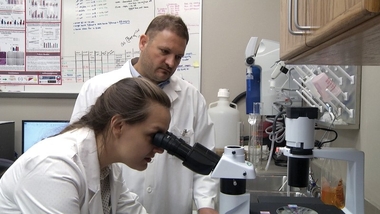Why does excess fat make you age faster?

Oklahoma and the nation overall have a big problem. The problem is obesity, and it doesn’t stop at the waistline. It turns out being obese makes you age faster too.
Now, a researcher at the University of Oklahoma College of Allied Health looks at the impact of obesity on aging and is hunting for ways to halt the aging impact of all that fat.
Michael Stout, Ph.D., an assistant professor in the college’s Department of Nutritional Sciences, and his team are working to unravel one of the mysteries of aging – why obesity accelerates the aging process.
“Some of these populations that are obese or pre-diabetic seemed to be aging faster, and not in terms of grey hair, but in terms of their metabolic profile,” Stout said.
“The implications are huge (pun intended) for a nation where obesity is so prevalent. In fact, the latest CDC report shows almost 40 percent of American adults are obese. The same holds true for nearly one in five teenagers in this country. Too many calories combined with too little exercise are obvious reasons for our expanding waistlines.
“What is less understood, though, is why obesity makes us age faster,” Stout reported.
Excess fat, it seems, is toxic to long life, setting off an avalanche of trouble deep inside the body at the cellular level. Stout and his team are particularly interested in how hormones impact these processes.
“So why are females protected with regard to one disease whereas males are not? And vice versa,” Stout pondered.
Laboratory models show that calorie-restricted diets protect against aging while obesity accelerates the process in the body. The long-term goal of the research team is to develop compounds that target metabolic pathways in the body the same way that calorie restriction does. It may sound like taking the easy way out; but let’s face it, calorie-restricted diets do not have a good track record with most.
“The problem is that it is very difficult to get humans to adhere to these strict dietary interventions for a long period,” Stout explained. “I’m a perfect example of that. I’ve done a lot of them, and I can’t adhere to them for more than four to six weeks.”
The OU Allied Health team already has hit upon some promising discoveries that may do the trick, thereby diminishing obesity and age-related disease, and fueling improved longevity.
“We currently are studying interventional compounds; specifically compounds that are non-feminizing estrogens,” Stout said.
One estrogen used is found naturally in the brain. In the lab, they supplement with more of it, then monitor the distribution of fats in the body. Their goal is to see if they can eliminate unhealthy fat, like fat in and around the liver.
“Some of these interventional compounds that we study seem to do that,” Stout said. “So then, if it works in the context of obesity and diabetes, can that then delay the aging process?”
It is nutritional science “sleuthing” as Stout and his team search for answers deep in our cells to the problem on our scales.
Dr. Stout’s research is currently funded by the National Institute on Aging, Reynolds Oklahoma Center on Aging, the Nathan Shock Centers at the Albert Einstein College of Medicine and Barshop Institute for Longevity and Aging Studies.
Copyright The Gayly. 8.12/2018 @ 9:34 a.m.





